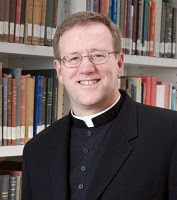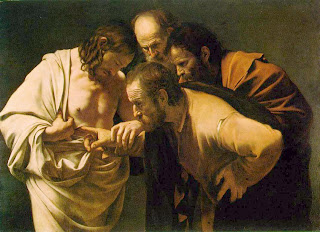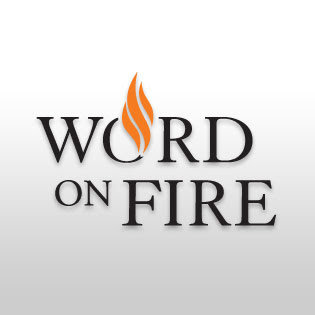 I’ve linked to Fr. Robert Barron many times before on this blog, particularly to his writings, his Youtube videos, and his “Catholicism Project”.
I’ve linked to Fr. Robert Barron many times before on this blog, particularly to his writings, his Youtube videos, and his “Catholicism Project”.
I consider him the most articulate and provocative teacher of the Faith today, grasping both the subtleties of theology and the currents of culture. He combines the Saints and Church Fathers, art and literature, theology and philosophy, serving them all together in digestible treats.
Fr. Barron’s current focus is “The Catholicism Project”, a ten-part documentary revealing the beauty, intelligence, and history of the Catholic story.
He and his group are traveling the world to film on-location at some of Christianity’s most vivid sites, including the Holy Land, Rome, Mexico, and Calcutta. Recently, Fr. Barron agreed to do an interview, answering some questions on Faith and his work:
Through “Word on Fire”, your podcasts, blogs, writings, and ambitious documentary, “The Catholicism Project”, you are reaching a multitude of people around the world. As someone using New Media to evangelize the globe, what advice would you give Christians on using these technologies in service of the Gospel, and what dangers lurk within their use?
Fr. Barron: My advice to those who would venture into the new media is to prepare yourself by immersing one’s self into the depths of the Catholic tradition. The great danger of the new media is that it seems to relish the superficial. There has been an ethos within the Church for many years to pursue an accommodationist strategy in regards to the culture, and this has resulted in a public presentation of the Faith that is often nebulous or “dumbed down.” Presenting the Faith as intelligible does not mean that we have to compromise the profundity of our great Tradition. We are the bearers of a Faith that inspired one of the most interesting civilizations that the world has ever known. The faithful are the route of access to this culture and its patrimony which is expressed in art, architecture, literature and theological reflection. The world needs to know all this, but we have to be sure that we know it ourselves before we can even begin to share the Faith with others.
In America, we’re witnessing a steady decline in the number of young-adults associating with a particular church or religious tradition, but a rising group of those considering themselves “spiritual, but not religious”. What do you think is the best route the Church should take to attract the 20-and-30-something generations back to the Church?
Fr. Barron: Be boldly, and at times, defiantly ourselves. Young people should not be patronized. They can only give assent to the One who is the Truth if they see that we are honest about who we are, what we believe, and why.
What would you consider to be the biggest issue preventing American Catholics from being full disciples of Jesus?
Fr. Barron: The influence of a secular culture that seeks to convince them that Christ is not unique and that the Church doesn’t really matter. This becomes a fall back position for Catholics when the real cost of discipleship becomes evident.
One of your gifts is your ability to clearly articulate cultural trends, especially as they relate to religion. What is the role of Christians in terms of interacting with and shaping the culture around them? 
Fr. Barron: The Christians bear into the culture testimony to Jesus Christ, risen from the dead, with all the implications of this startling revelation. This witness has its own innate power to radically reorient a culture.
What would you say have been the five most formative books in your spiritual journey? What list of books, outside of the Bible, would you say are “must-reads” for all Catholics?
Fr. Barron: The most formative books (outside the Bible) would be the writings of St. Thomas Aquinas, particularly the “Summa Theologica”. In addition to this, I would cite Thomas Merton’s “Seven Storey Mountain”, G.K. Chesterton’s “Orthodoxy”, Dante’s “Divine Comedy” and C.S. Lewis’ “Mere Christianity.” I would recommend these to all all Catholics as “must reads.”
Outside and beyond “The Catholicism Project”, what endeavors will you be working on in the near future?
Fr. Barron: I would like to see at least an hour of Catholic preaching and teaching nationally televised through secular media outlets. Networks like EWTN are great, but they are really an “ad intra” phenomenon and express the Church’s internal conversations. The Church needs to go out and draw the culture in and we can’t do this by presenting ourselves only within our own structures. Of course, the secular media outlets are not just going to give us this opportunity, so doing this will involve the commitment of resources and a willingness on the part of faithful Catholics to make some sacrifices.
To read more from Fr. Barron, check out the Word on Fire ministry page. They have a daily blog, archived writings, almost ten years (!!) of sermon podcasts, and tons of Youtube videos.
(I was most struck by Fr. Barron’s answer to the last question. In the 1950’s, Bishop Fulton Sheen was a pioneer of new media, celebrating the first religious service broadcast on television. He had a weekly T.V. program during which he preached for an hour, just as Fr. Barron prescribes. Bishop Sheen reached as many as 30 million people each week, while winning an Emmy in the process. Just as Bishop Sheen harnessed the new media of his day, Fr. Barron is using new media to communicate the beauty and power of the Catholic story today. May we each “put (our nets) out into deep water”, evangelizing the digital continent alongside him!)

